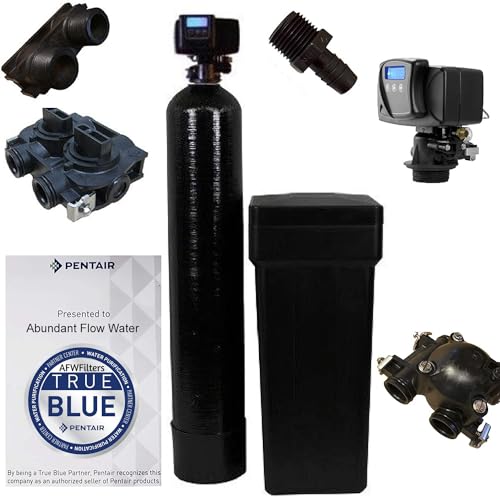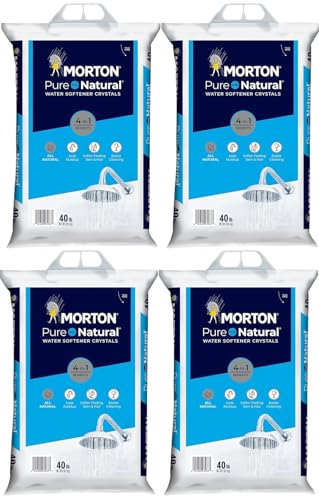Understanding Water Hardness and the Need for Water Softeners
Water hardness is an essential consideration for homeowners, as it reflects the mineral content of the water supply. Primarily, water hardness is attributed to the presence of dissolved minerals, notably calcium and magnesium. These minerals enter the water system as it passes through soil and rock formations, which can vary significantly based on geographical location. The hardness of water is typically measured in grains per gallon (GPG) or parts per million (PPM), with classifications ranging from soft water (0-3 GPG) to very hard water (greater than 10.5 GPG).
The implications of hard water can be substantial and warrant serious attention. A common telltale sign of hard water is the formation of scale buildup on faucets, showerheads, and inside appliances such as dishwashers and water heaters. This buildup occurs due to the precipitation of calcium carbonate when heated, leading to inefficiencies in appliance operation and ultimately requiring costly repairs or replacements. Additionally, hard water can have adverse effects on skin and hair, often causing irritation, dryness, and damage over time. Laundry affected by hard water can result in dingy or unclean clothing, further emphasizing the need for a solution.
The importance of installing a water softener in areas with high water hardness levels cannot be overstated. Water softeners work by exchanging calcium and magnesium ions with sodium or potassium ions through a process known as ion exchange. This treatment effectively reduces water hardness, providing numerous benefits, including improved appliance efficiency, better soap performance, and enhanced skin health. For households encountering the challenges of hard water, investing in a water softener system presents a viable solution to mitigate these issues and enhance the overall quality of water consumption.
The Benefits of Using a Water Softener System
Water softener systems play a crucial role in enhancing the quality of water in households and industries. One of the primary benefits is the increased longevity of appliances. Hard water can lead to the accumulation of mineral deposits, which in turn can affect the efficiency and lifespan of appliances such as dishwashers, washing machines, and water heaters. By utilizing a water softener, mineral content in water is significantly reduced, allowing appliances to function optimally. As a result, users can expect fewer breakdowns and a reduction in repair costs over time.
Additionally, the effectiveness of soaps and detergents is notably improved when soft water is used. Hard water tends to inhibit the lathering ability of soaps, meaning that individuals often use more product to achieve the same cleaning results. With softened water, less detergent is needed, leading not only to cost savings on cleaning supplies but also a more efficient cleaning process. Moreover, the absence of minerals prevents the formation of soap scum, making cleaning bathrooms and kitchens easier and less time-consuming.
Soft water is also beneficial for skin and hair health. Hard water can lead to dry skin and brittle hair due to the residue minerals it leaves behind. Softened water helps maintain moisture balance in the skin and reduces the risk of irritation, thereby improving overall comfort. Hair becomes shinier and softer, which can enhance personal appearance and self-esteem.
From a financial perspective, investing in a water softener can lead to lower energy bills. Soft water increases the efficiency of water heaters, as they do not have to work as hard to heat water laden with minerals. This efficiency translates into energy savings, making the initial investment in a water softener system more appealing when considering the long-term benefits.
The Consequences of Not Maintaining Your Water Softener
Failing to maintain your water softener can have significant repercussions that extend beyond the immediate functionality of the system. One of the most pressing issues is the buildup of scale in pipes and appliances, which occurs when hard water minerals are not adequately removed. Over time, this scale can accumulate, leading to clogs and decreased efficiency in appliances such as dishwashers and water heaters. Consequently, the lifespan of these appliances may be dramatically reduced, resulting in costly repairs or premature replacements.
In addition to structural issues, neglecting water softener maintenance can precipitate potential water quality problems. As the softener’s effectiveness diminishes, hard water symptoms, such as soap scum, dry skin, and dull hair, may resurface. These quality issues not only impact personal comfort but can also raise health concerns, particularly for those with skin sensitivities or other health conditions exacerbated by hard water exposure.
Energy costs also tend to increase when a water softener system is not regularly maintained. Appliances working harder due to scale buildup require more energy to operate, leading to higher utility bills. For instance, a water heater that must work overtime to heat water that is laden with minerals will use more energy, thus elevating monthly expenses. By ensuring regular check-ups and salt replenishment for your water softener, homeowners can significantly mitigate these costs.
Ultimately, the long-term impact of neglecting your water softener can greatly affect both home infrastructure and individual well-being. Understanding the importance of a functioning water softener not only enhances the quality of the water used in a household but also protects investment in appliances, ensuring they operate efficiently for years to come.
Best Practices for Water Softener Maintenance
To ensure the longevity and efficiency of your water softener system, implementing best practices for regular maintenance is essential. One of the primary tasks involves monitoring the salt levels within the brine tank. Salt is a critical component for the ion exchange process that softens hard water. Homeowners should routinely check the salt level and replenish it as necessary, ideally maintaining a level that is at least half full. This practice helps prevent the system from running out of salt, which can lead to ineffective softening and increased hardness in the water.
Scheduling periodic professional maintenance is another vital aspect of water softener upkeep. It is advisable to have a qualified technician inspect your system at least once a year. During this visit, the technician can check for mechanical issues, clean the resin tank, and perform a thorough evaluation of the unit’s performance. This proactive approach not only addresses potential problems before they escalate but also enhances the overall functionality of the system.
Troubleshooting common water softener problems can also help maintain the system’s efficiency. Homeowners should be vigilant about recognizing signs of issues, such as a decline in water softness or increased hardness. If these problems arise, checking the salt levels, inspecting the settings, and looking for leaks are good first steps. Additionally, it is beneficial to periodically test the hardness levels of the water using a testing kit. This helps in confirming that the water softener is functioning correctly and can guide adjustments if necessary.
By adhering to these best practices, homeowners can maximize the efficiency of their water softener systems, allowing them to fully experience the benefits of softened water while avoiding costly repairs and replacements in the long run.






